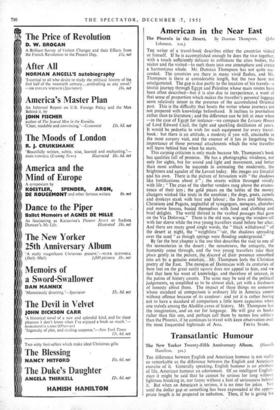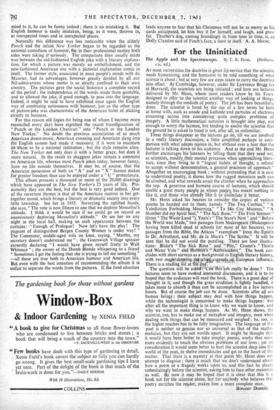Transatlantic Humour
The New Yorker Twenty-Fifth Anniversary Album, (Ilamish Fiamilton. 305.) THE difference between English and American humour is not really so remarkable as the difference between the English and American exercise of it. Generally speaking, English humour is an attribute of life, American humour an adornment. Of an intelligent English- man it might be said that he cannot be serious for long without lightness breaking in, nor funny without a hint of seriousness behind it. But when an American is serious, it is no time for jokes. Not until the dollar gap or something has been expounded at the appro- priate length is he prepared to unbutton. Then, if he is giving his
mind Wit, he can be funny indeed ; there is no mistaking it. Bit English humour is easily 'mistaken, being, as it were, thrown in, at unexpected times and in unexpected places. "
Naturally this difference was less noticeable when the elderly Punch and the infant_ New Yorker began to be regarded as the national custodians of humour,-fer in their professional motley both
sides were taking it' seriously. The comparison then usually made was between the old-fashioned English joke with a literary explana- tion, for which a picture. was merely an embellishment, and the new-fashioned American one with a pictorial explanation comic in itself. The former style, associated in most people's minds, with du. Maurier, had its advantages, however greatly derided by all .our Nil-admirarians' whose motto is so strictly confined to their own country. The pictures gave the social historian a complete record co( the period ; the independence of the words made them quotable, and so allowed the jokei if good enough, to pass into the language. Indeed, it might be said to have exhibited once- again the English way of combining seriousness with humour,, just as the other type of picture-joke was characteristic of the American habit of sticking strictly to business. 'For this reason old fogies (to being one of whom I become more reconciled- every day) have regretted the recent transfiguration of-' "Punch or the London Charivari " into "Punch or the London New Yorker." No doubt the previous assimilation of so much American dance-music, American crooning and American slang into the'English system had made it'necesiary, if it were to maintain ittiVaim to be a national institution ; but, the style remains alien. The New Yorker not only does it with a better grace, but does it more natural. In the result its shaggiest jokes remain a comment on American life, whereas most Punch jokes today, however funny, have no life outside themselves. It may be, of course, that the American possession of both an " A " and an " X " licence makes for greater freedom than can be enjoyed under a" U" protectorate.
This album_ presents a thousand or more of the 20,000 drawings which have appeared in The New Yorker's 25 years of life. .Pre- sumably they are the best, but the best is very good indeed. One of the recurrent themes is that of the American matron in her get- together mood, which brings a literary or dramatic society into every little township. See her in 1935. Surveying the uplifted hands, she' says, "The vote is now, fifteen to one that we deplore Mussolini's attitude. I thibk it would be nice if we could go on record as unanimously deploring Mussolini's attitude." Or see her on any night in the local hall, making an arch appearance between the curtains "Enough of Prologue! Now- let's have the play! The pageant of distinguished Bergen County Women is under way!" The Commuter, middle-aged wife on knee, saying, "Martha, my secretary doesn't understand me " ; the Greenwich Village spinster earnestly declaring "I would have given myself freely to Walt Whitman " ; the owner of the Dumb Blonde whispering to a friend "Sometimes I get the feeling that she is trying to tell me something" —all these are true both to American humour and American life. But even with the best intention of recommending the album it is unfair to separate the words from the pictures. If .the food situation leads anyone to fear that his Christmas will not be as merry as his cards anticipated, let him buy it for himself, and laugh, and grow fat. Thurber's dog, coming broodingly in from time to time, is, as Dolly Clandon said of Finch's face, a feast in itself. A. A. MILNE.



















































 Previous page
Previous page